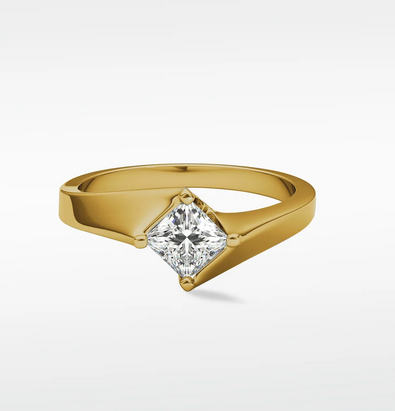Benefits of Choosing an Ethical Engagement Ring
Engagement rings symbolise a commitment of love and devotion, but they can also signify a commitment to ethical values. In recent years, the demand for ethical engagement rings has surged as couples seek alternatives that align with their environmental and social consciousness.
Let's explore the numerous benefits of choosing an ethical engagement ring, from supporting fair trade practices to reducing environmental impact.
What is an Ethical & Sustainable Engagement Ring?
An ethical engagement ring is more than just a symbol of love; it's a testament to values of integrity and sustainability. Sourced with care, conflict free engagement rings ensure that their materials, such as diamonds and fair trade metals, are obtained without harm to people or the environment. By prioritising transparent and ethical supply chains, couples can wear their rings with confidence, knowing that their love story is not tainted by unethical practices.
In addition to responsible material sourcing, ethical engagement rings often embrace eco-friendly practices, such as using recycled metals and lab-grown gemstones. These choices reduce environmental impact and promote sustainability. Ultimately, an ethical engagement ring is a declaration of love that extends beyond the couple, embodying a commitment to a more just and compassionate world. At Lark & Berry, we support communities and advocate for fair practices in the jewellery industry in an effort to end the blood diamond trade.

Ethical Issues of Mined Diamonds
In recent times, the once pristine image of diamonds has been marred by ethical concerns. Behind their shimmer lies a troubling narrative of environmental degradation, human rights violations, and exploitation. This revelation has prompted a critical reassessment of the diamond industry and a growing demand for more ethical alternatives.
Environmental Damage
When considering the ethical implications of mined diamonds, one significant concern is the environmental damage caused by mining operations. The extraction process often involves significant land disruption, deforestation, and the release of pollutants into water sources, endangering local ecosystems and wildlife. Additionally, the carbon footprint of diamond mining contributes to climate change, worsening environmental challenges globally.
Human Rights Violations
Another pressing issue is the prevalence of human rights violations within the diamond industry. From forced labor to unsafe working conditions, many miners endure exploitation and abuse in their pursuit of diamonds. This exploitation extends beyond the miners themselves, affecting communities living near mining sites who may suffer from displacement, land grabbing, and disruption of their traditional way of life.
Child Labor
Child labor remains a distressing reality in many diamond-producing regions, with children as young as five years old working in hazardous conditions to extract diamonds. This exploitation not only deprives children of their right to education and a proper childhood but also perpetuates cycles of poverty and vulnerability within affected communities.
Conflict & Corruption
The link between diamonds and conflict is well-documented, with many diamonds originating from regions plagued by violence, civil unrest, and corruption. Proceeds from the sale of these "blood diamonds" often fund armed conflicts, prolonging suffering and instability in affected regions while fueling illicit networks and organised crime.
High Price & Lower Quality
The high price tag associated with mined diamonds often doesn't correlate with their quality. Consumers may unknowingly pay inflated prices for stones that have been subject to unethical practices, further maintaining a system that prioritises profit over transparency and integrity. Considering these ethical concerns, consumers increasingly seek alternatives such as lab-grown diamonds or ethically sourced alternatives to ensure their purchases align with their values.

Minimizing Environmental Impact With Ethically Sourced Engagement Rings
When you choose an ethically sourced engagement ring, you're not just making a statement; you're contributing to a greener planet. These rings are crafted with environmentally friendly practices, minimising the carbon footprint associated with traditional mining. By opting for ethically sourced materials, you're actively participating in the preservation of our natural resources and ecosystems, ensuring a brighter future for generations to come.
Environmentally Friendly
Lab-grown diamonds offer an environmentally friendly alternative to mined diamonds. These diamonds are created using sustainable processes that minimise environmental impact, such as reducing energy consumption and avoiding harmful mining practices. By choosing lab-grown diamonds, consumers support eco-conscious production methods that alleviate pressure on natural ecosystems and contribute to a more sustainable future.

Conflict Free & Responsibly Sourced
Ethical diamonds guarantee conflict-free and responsibly sourced gemstones, ensuring that no human rights violations or environmental damage occur in their extraction and production processes. These diamonds are traced from their origin, adhering to strict standards that prioritise fair labor practices and environmental sustainability. Similarly, lab-grown diamonds offer conflict-free alternatives, as they are created in controlled laboratory settings, free from the ethical concerns associated with traditional diamond mining.
Cost Effective and Higher Quality Diamonds
Cost Effective
Lab-grown diamonds offer a cost-effective alternative to mined diamonds. Produced in controlled laboratory environments, they avoid the expenses of traditional mining, leading to lower prices. The scalability of lab-grown diamond production ensures consistent supply and stable pricing, making them an attractive option for budget-conscious consumers seeking both affordability and quality. A 2023 article from CBS News reported that, for example, a 1-carat princess-cut diamond cut from a mined diamond would cost roughly $2,500, versus about $500 for a same-quality lab-grown equivalent.

Higher Quality Diamonds
Every colourless lab-grown diamond is classified as Type IIa—the purest type of diamond. In fact, less than 2 percent of the world's mined diamonds are pure enough to reach this classification. This remarkable purity ensures that lab-grown diamonds exhibit exceptional clarity, free from the inclusions and impurities often found in mined diamonds. As a result, lab-grown diamond rings offer couples a dazzling brilliance and sparkle that rivals that of natural diamond rings.
Aligns with Personal Values
Imagine gazing at your ring and seeing beyond its exquisite beauty and high quality to then have a sense of pride, knowing that it was ethically sourced and responsibly crafted. This extra layer of meaning transforms the symbol of your love as a couple into a powerful statement of your shared values and commitment to making a positive impact on the world.
When you choose ethically sourced diamonds for your engagement ring, you're not just making a fashion statement; you're making a statement of conscience. You're standing up against exploitation, bad environmental practices and championing a more just and sustainable future. These diamonds carry a story of empowerment and resilience, reminding us that even in the darkest of industries, there is hope for change.

Tips for Buying an Ethical Diamond Engagement Ring
Do Your Research
When embarking on this journey, consider factors beyond the dazzle of the gemstone, such as the history, claims and reviews of the brand, so that you can be assured of the jeweller's commitment to ethical practices. Don’t hesitate to inquire about the jeweller's sourcing and production methods, including their efforts to support responsible mining practices and fair labor conditions.
Only Purchase Certified Diamonds
Always insist on diamonds that are certified by reputable gemological laboratories such as the Gemological Institute of America (GIA), the International Gemological Institute (IGI), or the American Gem Society Laboratories (AGS). These organisations are renowned for their rigorous standards and unbiased assessments of a diamond's quality and characteristics. By prioritising diamonds with certifications from established and trusted gemological laboratories, you can ensure the authenticity and quality of your diamond purchase.
Choose a Lab-Grown Diamond
Choosing a lab-grown diamond ensures you're getting a certified conflict free engagement ring by guaranteeing ethically produced gemstones with minimal environmental impact. These diamonds offer transparency, traceability, and support innovation in the jewellery industry, providing a sustainable and responsible choice for couples seeking an ethical symbol of love.
Lark & Berry offers custom engagement rings, allowing you to create a unique engagement ring that reflects your individual style and values. From selecting ethically sourced diamonds to choosing recycled metals, these bespoke options empower couples to design a ring that truly speaks to their love story.
Remember that every ethical purchase is a step towards a more responsible future. By choosing an ethical engagement ring, you're not just investing in a piece of jewellery; you're investing in a vision of sustainability, equity, and compassion. Your ring becomes more than a symbol of love; it becomes a beacon of hope for a brighter tomorrow.



